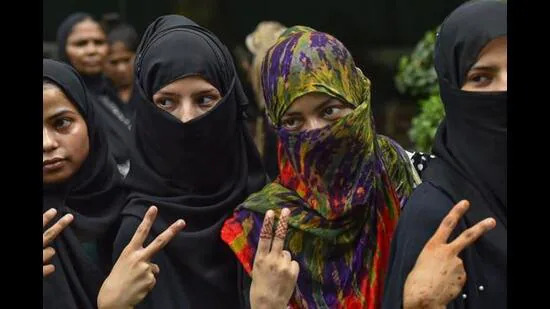The demand for banning polygamy and halala remains. For how much longer will Muslim women be excluded from the gains won by other Indian women?

Caught in the crossfire between prevailing majoritarianism and the need to defend minority rights, Muslim women bear a double burden. For how much longer will they be excluded from the gains won by other Indian women, gains promised by the principles of a modern Constitution? (PTI)
In the summer of 2017, five judges of the Supreme Court (SC) sat down to answer one question: Was the practice of triple talaq — where a Muslim husband could divorce his wife by saying the word for divorce three times — “fundamental” to the practice of Islam? The hearing was long overdue. India’s personal laws allow different religions to follow their customs in marriage, adoption, inheritance, and divorce. While Hindu law reform began in the 1950s (to great protest by status quoits), Muslim personal law proved trickier.
A court order granting maintenance of ₹179.20 a month to a divorced woman, Shah Bano, led to such an outcry by the clergy that the then Congress government passed the disingenuously named Muslim Women (Protection of Rights on Divorce) Act in 1986.
Now, in 2017, a new generation of increasingly vocal Muslim women asked the court to look into three practices: Triple talaq, halala (for a man to remarry a former wife, she must first marry and consummate that marriage with another man) and polygamy.
But the court said time was short and, so, would hear only triple talaq. The courts struck down instant talaq and the government enacted a law banning it in 2019.
Halala and polygamy were packed off to another five-judge bench. In the years since, two retired. In November, advocate Ashwini Upadhyay and five Muslim women reminded the court that the issue was pending. “We will form a bench,” Chief Justice DY Chandrachud assured them.
Earlier this week, the Bharatiya Muslim Mahila Andolan (BMMA), which has been working on Muslim family law reform in conformity with the Koran and the Constitution, released a report on how polygamy affects the lives of women. Conducted by Noorjehan Safia Niaz and Zakia Soman, BMMA co-founders, the study found that 84% of Muslim women want polygamy to be illegal.
Admittedly the sample of 289 women is small, but its findings are devastating: 90% said husbands did not seek their permission before taking a second wife but had to accept it because they had no options. The cost included mental trauma and loss of dignity.
The triple talaq debate was guided by personal law rather than gender justice. Yet, gender rights is at the heart of the issue at a time when Muslim women are smashing stereotypes of being hapless creatures in need of saving.
If Muslim schoolgirls are to be granted autonomy in choosing to wear the hijab, how can their sisters and mothers be denied that same autonomy in asserting their right to equal citizenship?
Caught in the crossfire between prevailing majoritarianism and the need to defend minority rights, Muslim women bear a double burden. For how much longer will they be excluded from the gains won by other Indian women, gains promised by the principles of a modern Constitution?
At the very least, they deserve an answer. The New Year is as good a time as any to provide it.
This article was originally published in Hindustan Times on December 23, 2022